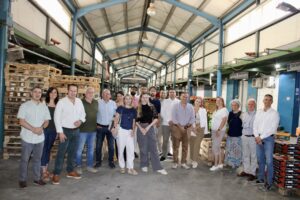The 4th Steering Committee Meeting of the GARDEN project was successfully held on 19–20 June 2025 in Heraklion, at the Cultural Conference Centre, hosted by our project partner LDO Heraklion. This key project milestone gathered representatives from all partner institutions to review progress, exchange knowledge, and align strategic directions in building resilient, circular, and sustainable food systems across the Mediterranean.
A Two-Day Programme of Collaboration and Insight
The meeting opened with a guided tour through the historic centre of Heraklion, offering participants a taste of the city’s rich cultural heritage. This informal start created a welcoming atmosphere for what followed — two full days of collaborative work sessions, discussion, and on-site learning.
The first working sessions were dedicated to updates from all pilot sites, where partners presented their local activities, challenges, and adaptations. These presentations demonstrated the diversity of territorial contexts while reaffirming the importance of shared values and goals across the consortium.
Key Work Package Highlights
WP1 discussions focused on the presentation of finalized deliverables D1.1.1 and D1.2.1, with proposals for potential updates reflecting recent pilot developments. Communication and participatory tools were also presented, particularly under WP2, alongside the evaluation framework and the evolving design of pilot brochures and maps.
WP4 sessions explored how to capitalise on project results and formulate actionable recommendations for public authorities. Activities aimed at amplifying the visibility of GARDEN through national and transnational events were also discussed, including synergies with the Euro-MED Academy and other governance platforms.
WP3 – Technical Focus and Grounded Discussion
A key segment of the second day was dedicated to Work Package 3 (WP3), which focuses on the technical implementation of solutions across pilot sites. The session opened with the presentation of Deliverable D3.1.1, a set of descriptive technical sheets documenting the solutions applied in each territory.
This was followed by an in-depth discussion addressing:
-
technical characteristics of implemented actions,
-
adaptation needs specific to each local context,
-
and gaps between planning and execution phases.
The presence of the Project Officer enriched the discussion, providing strategic guidance and facilitating an open exchange about how to address emerging challenges and maximise technical coherence. WP3 discussions reaffirmed the project’s commitment to evidence-based, site-sensitive innovation, while maintaining a strong connection to the overall Euro-MED vision of Green Living Areas.
Field Visit and Cultural Context
Participants visited the Heraklion Central Food Market, one of the GARDEN pilot sites, to see how project principles are being translated into local action. The visit offered valuable insights into the interaction between urban infrastructure, local producers, and consumers — and how policy and planning can shape that interaction.
The meeting concluded with a guided visit to the Heraklion Archaeological Museum, offering reflection on the deep historical relationship between food, trade, and place in the Mediterranean. A warm thank you goes to LDO Heraklion for hosting both the technical and cultural elements of the event with generosity and dedication.
Looking Ahead
The Heraklion meeting was a strong reminder that impactful change happens through both strategic planning and human connection. As the GARDEN project moves forward, the clarity, energy, and shared purpose reinforced during these two days will continue to guide the work of all partners.
We extend sincere thanks to all participants for their active engagement, and especially to LDO Heraklion for their excellent organisation and hospitality.



